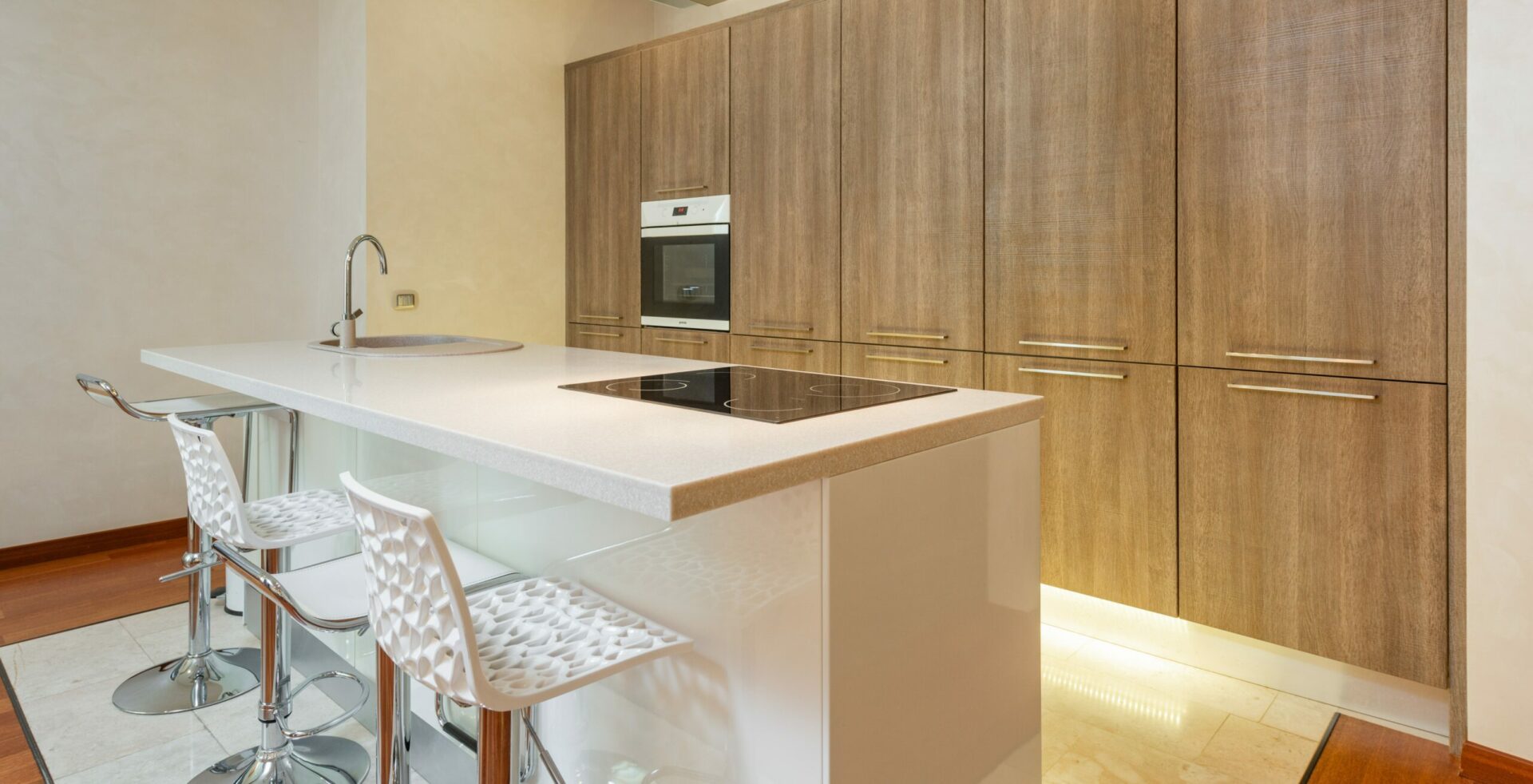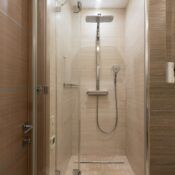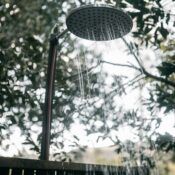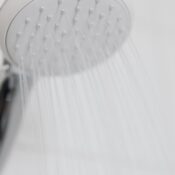Unless you are a neat freak, you will sometimes notice some soap scum, build up of hard water or shower mildew in your shower room. The white soap scum and mildew usually form from the continuous build-up of soap lather, dirt, skin cells, body oil and water minerals. And while this foul combination can form on the shower door and walls, it mainly builds up on the shower floors.
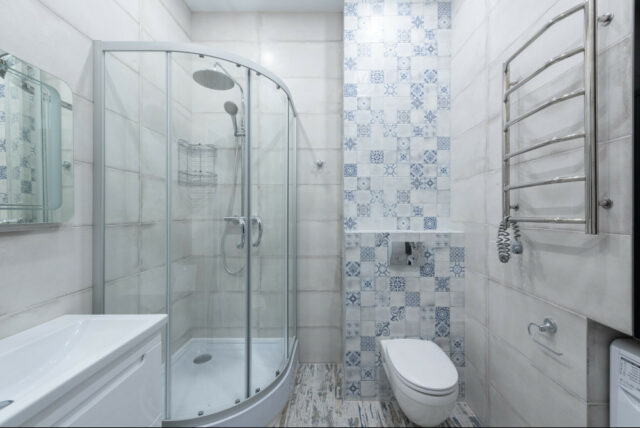
However, just because you are no neat freak does not mean that you should ignore the soap scum and dirt build-up on your shower floors.
The good news is: with the right approach, cleaning a shower floor doesn’t have to be a difficult task. We have researched all the possible ways to clean a shower floor and in this article, we discuss the easiest, and most effective ways on cleaning a shower floor so that it shines like new.
How to Clean a Shower Floor
The method that you should use to clean your shower floor is mainly dependent on what material the floor is made from. Generally, you are recommended to use a vinegar and baking soda solution. This gentle, natural cleanser effectively removes any tough soap scums and build-up of hard water.
Also, compared with shower stalls, bathtub showers are much easier to clean. All you need to do is fill the tub with water, then thoroughly scrub the sides as if you were cleaning it typically. Alternatively, you can soak the bottom (floor) of the bathtub then scrub it down after several minutes.
How to Clean a Fiberglass Shower Floor
To clean a fiberglass shower floor, you will need to use a non-abrasive type of cleaner. Good examples of such cleaners include pine oil, baking soda, vinegar and all-purpose bathroom cleaner. The major disadvantage of using overly abrasive solutions and scrubs is that they tend to scratch and damage the delicate fiberglass surface.
The Baking Soda Method:
1.) Sprinkle baking soda on your shower floor – Make sure you cover the entire floor surface and that you reach the cracks and crevices that are usually hard to reach.
2.) Fill a clean spray bottle with water and moisten the baking soda with it
3.) Let the paste sit for a few hours before rinsing off, you can use your shower fixture to get it well rinsed.
How to Clean a Shower Floor With Vinegar and Baking Soda:
Materials Needed:
- 3 cups water
- 1/3 cup baking soda
- 1 cup white vinegar
- 2 tablespoons dish soap (preferably Dawn)
The Process:
1.) Mix the above solution in a spray bottle, then allow it to fizzle before putting back the top.
2.) Spray the solution on your shower floor.
3.) Let it sit for at least 5 minutes.
4.) Using a sponge/toothbrush, gently scrub the floor.
5.) Rinse it off with running shower water.
How to Clean a Shower Floor With Fabric Softener
Materials Needed:
- 1/2 cup fabric softener
- 1 cup warm water
The Process:
1.) Mix the warm water with the fabric softener in a spray bottle.
2.) Spray down the solution on the shower floor, as well as on the cracks and crevices.
3.) Let the solution sit for 5-30 minutes – The amount of time will depend on how much stuck-on gunk is on your floor.
4.) Using a wet sponge and toothbrush, scrub off any grease and tough soap scums.
5.) Run the shower to rinse off the solution.
How to Clean Textured Shower Floors
Textured and stone-surface shower floors are quite tough to clean. If your textured floors have already developed tough soap scums, the following recipe can help you clean them with ease:
Materials Needed:
- Warm water
- Mineral oil
- White vinegar
The Process:
1.) Prepare a solution of warm water and mineral oil in a spray bottle (in the ratio 1:4).
2.) Spray the solution on your textured floor.
3.) Using a sponge, scrub the floor in gentle circular motions.
4.) Further, clean the floor using a mixture of warm water and white vinegar.
5.) Rinse off the solution using warm water only.
How to Clean a Shower Floor Daily
Cleaning your shower floor daily is vital, since it helps you prevent the formation of tough and stubborn scums. In turn, this reduces the need for regular, deep cleaning. The following are 3 tips that can help you keep your shower floors clean:
- Open the doors at least once a day to allow for clean airflow.
- After every bathroom use, wipe down your shower – This helps to reduce growth of mold and mildew.
- To prevent regular mildewing, spray your shower floors and walls with a disinfectant.
The Best Time to Clean Your Shower Floors
The most recommended time to clean your shower floors is right after using the shower. The shower water and hot steam produced during bathing loosens up all the soap scum and dirt on the floors. Therefore, cleaning your shower floors right after bathing is usually much easier and effortless.
How Often Do I Deep Clean My Shower Floors?
Light cleaning of shower floors can be done on a daily basis. However, you are encouraged to deep clean the floors at least once a month. Monthly deep cleaning is especially important if you find it difficult to follow the daily regimen of wiping and airing out the shower room.
A deep and thorough monthly cleaning ensures that your shower floors do not develop mold or become breeding grounds for fungi, which could cause foot infections.
Additional Tips for a Clean Shower Floor
The following are more cleaning tips that can make cleaning of shower floors easier and more effective:
- When cleaning a shower stall, it is best that you start at the top. From there, you can then work your way down.
- To remove deposits that block spigots, you can use a toothpick or toothbrush.
- To remove hard water deposits on the shower head, spray a solution of vinegar and warm water.
- You should always clean the shower head first, then the doors and walls, and finally the floor.
Your shower floors should not just be safe for bathing, but also clean and appealing. Therefore, while cleaning may not be your favorite activity, you should put in that extra effort to clean your shower floors. The above homemade methods on cleaning a shower floor will ensure that your shower floors always remain clean, while retaining their attractive appeal for long.
